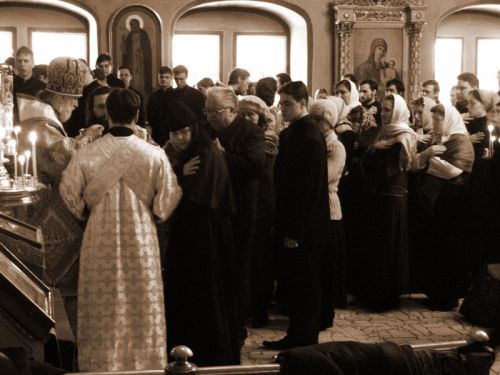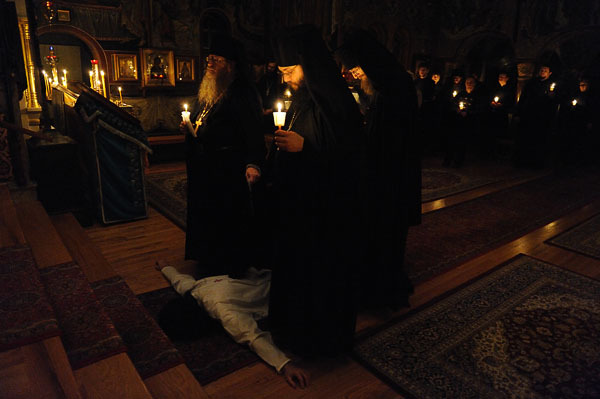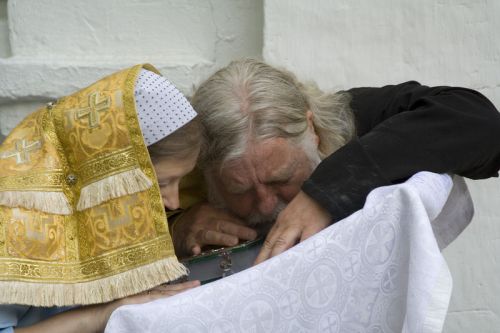Source: Orthodox Canada. The Canadian Journal of Orthodox Christian Thought and Theology
The efforts of Western theologians to establish rationalized definitions for all the sacred things and acts of Christianity compelled them to examine all these matters illogically, in an attempt to categorize them and separate some from others on the basis of relative importance. Such an approach is unavoidable in an atmosphere where religious life is based on the principle of juridical legalism, where the inner quickening of the Spirit is replaced with a reign of strict discipline, and there is no place for the triumph of the regenerated soul. In harmony with this principle, the tendency of scholastic theology to attempt to define everything by an exact number, led to the Roman Catholic teaching that there are exactly seven church sacraments, which are the exclusive sources of divine grace.
 |
| Photo: Hegumen Vsevolod (Varuschenko), http://www.bogoslov.ru/ |
Such a teaching excessively exalts the hierarchy above the people of God, since it is the exclusive prerogative of the representatives of the hierarchy to serve these sacraments. The entire inner, spiritual life of the Church is thus conveniently reduced to the performing of these sacraments, and this placed the whole matter of salvation in the hands of the hierarchy, relegating the people to a passive, subjugated role in the general structure of Church life, denying them any living, active participation. In addition to this practical significance in the life of Western Christianity, the teaching of seven sacraments naturally follows the [erroneous] teaching about the "three offices" of the Lord, the "satisfaction of divine justice" and "juridical truth" which is supposedly manifested in the life of the Lord. The Roman Catholics state the matter thus in one of their catechisms:
"`Sacraments' is the name given to physical sacred forms established by Jesus Christ for the bestowal of grace. The Old Testament had a multitude of rituals, but not a single sacrament which communicated grace. These sacraments belong only to the New Testament. Jesus Christ Himself established them so that His blood and infinite grace, which are abundant and sufficient to encompass all people, might be assimilated by all his followers."
In the process of importing the Latin system of theology and the scholastic manner of reasoning, into the Ukrainian ecclesiastical school in the 17th century, Kievan theologians first introduced the teaching of seven sacraments to Orthodox Christianity. This teaching, a Roman one, both in origin (Peter of Lombardy) and in juridical content, did not encounter resistance on the part of the naive Russian people, who did not realize how completely contrary it is to sacred tradition. It is completely clear, from a survey of the Russian church writers Joseph and Zinovy, that in the 16th century, the Orthodox Church in Russia had never heard of any sevenfold number relating to the Holy Mysteries. The very definition of the mysteries as sacraments is taken from the Latin catechism: "A sacrament is a visible sign of God's invisible grace, given for our sanctification," says Lavrenty Zizany. "A sacrament is a sacred action which, under the guise of form, communicates God's invisible grace to the soul of a believer," teaches Peter Mohyla.
It is not difficult to grasp the arbitrariness and artificiality of these definitions and concepts. All theologically educated people know that in the language of Holy Scripture and of Orthodox Christian patristic works, the expression `Mystery' does not have a sacramental sense, which is attributed to it by the scholastics. Not only in the poetical and rhetorical works, but also in the deeply theological expressions of the holy fathers, the term "Mysteries" designates all the manifestations of divine grace, independent of any formalistic conditions of their accomplishment. Incidents in the life of our Lord are also referred to as "Mysteries," and the very Christian teaching itself is called a "Mystery." St Gregory the Theologian calls the feast of the Nativity and Theophany "Mysteries." Other phenomena of the sacred life, and also monastic tonsure are called Holy Mysteries in sacred hymns of the Church. The Russian theologians of the 16th century faithfully adhered to the broad, Orthodox Christian sense of this concept, and only in the 17th century did Russian theology begin to assimilate this novel [sacramental] concept of the term "Holy Mysteries" or "Mystery."
Following the Latins, Lavrenty Zizany and Peter Mohyla consider a specific, demonstrable proof of divine establishment to be the distinguishing sign of the "sacraments". If one wished to define this sign exactly and clearly, then one would have to search for a very long time and very carefully in the Holy Bible. If we take them at their word, then we must come the conclusion that so far as the "sacraments" are concerned, the scholastics gave greater significance to ranking them than to demonstrating a direct and exact proof of establishment by divine will. In most cases, they considered as sufficient proof of "divine establishment," a vague hint in the Gospel or a casual presence of Jesus Christ at the occurrence of some common event of life, although this hint or presence might be remote from its spiritual significance. In other cases, there is not even an example in the life of the Lord which can be mentioned. Moreover, the principle of the provable divine establishment of seven sacraments, degrades other divine services which are no less important and which are certainly divinely established. There is, in fact, a firm testimony of St Basil the Great which establishes the clearly divine origins of rites, acts and manifestations of Church life which are not included in these "seven sacraments":
 |
| Photo: Holy Trinity Monastery, http://www.jordanville.org/ |
"Of the teachings and practices preserved in the Church, some we have from written instruction; others we have received `in silence' by the Apostolic tradition. Both of these have the same authority in relation to true religion. And no one will contradict these __ no one, that is, who is even moderately knowledgeable in the institutions of the Church. For if we were to attempt to reject such traditions as have no written authority, on the grounds that they are of little importance, we would inadvertently injure the Gospel in its very vitals; or rather, we would make our public preaching a mere phrase and nothing more" (On The Holy Spirit, 27:66).
Advocates will not tolerate signs of these "seven sacraments" other than the "external form of inner grace" categorization. Nevertheless, in the life of the Church there are other divine services which fully satisfy these conditions, but which, for some reason, the scholastics do not consider worthy of the name "Holy Mysteries," [or "sacraments"]. There is even a divine service which has the greatest importance for the whole life of the one receiving it, and has always been regarded, along with baptism, the Eucharist and ordination to be a great manifestation of divine grace, but which is regarded by the scholastics as lower than simple confession or anointing. This divine service is the rite of monastic tonsure, which is called a Holy Mystery in the works of St Dionysios the Areopagite and St Theodore the Studite. Thus we cannot be reconciled with the "internal/external signs" by which we are supposedly obligated to distinguish a "Holy Mystery" from other divine services.
In examining this concept of "sacrament," one is struck by the dichotomy of character and significance which has created a strange division into "sacraments absolutely necessary for salvation and ones only relatively necessary for salvation. Such a division is possible only when salvation is viewed as a formalism. We read in the [heretical] Great Catechism:
Those which are absolutely necessary for salvation are three: baptism, communion and penance. Those necessary for salvation are two: confirmation and last rite unction. Marriage is necessary for those who use it to help preserve them from fornication, and absolutely necessary in bearing children for the sake of fulfilling the Church. The priesthood is similar. It is necessary for those ordained to direct the Church and perform the holy sacraments of God" (para. 30).
By their very name, all the Holy Mysteries must have equal significance, yet the incomprehensibility and confusion engendered by such a legalistic division of the Holy Mysteries is evident even to the author of the Great Catechism himself. Later, he adds still more Latin scholasticism, writing:
"It is beneficial for you to know of yet another division. All seven sacraments are necessary, but not for every person, nor are they equal. Marriage and priesthood are absolutely necessary for the Church, nevertheless, one who is not married and not ordained can be saved. The other five sacraments are necessary for salvation, but not equally so. Baptism, Communion and penance are absolutely necessary for everyone for salvation, and will save. Without them, not a single person can be saved. Holy unction and last rites are necessary for salvation in this degree: they give us more assurance of our salvation, for holy oil prepares us to suffer with more assurance, while last rites release one from all remains of sins. For this reason, one who is neglectful of them has no certainty of his salvation, unless he desired them but was unable to obtain them" (ibid).
Though he did not attribute varied significance to the Holy Mysteries, Lavrenty Zizany nevertheless asserts the sevenfold number and sacramental nature of them.
Regardless of the convincing tone of these writers, every unbiased reader who is acquainted with the spirit of patristic writings remains convinced that the very idea of a Holy Mystery being understood as a sacramental act special and different in comparison with other divine services and acts, belongs exclusively to Latin [Roman Catholic] theology. He will also understand that the number of such sacred actions is set by the scholastics arbitrarily and artificially, that deliberation about a greater or lesser necessity for salvation of one or another of the Holy Mysteries is foolish. For, salvation is accomplished not by separate sacred actions, but by union with the life of the Church, in which there is nothing which has little significance. Such divine services as the great blessing of water, monastic tonsure and the funeral service are no less significant and important than others. We find it onerous to make comparisons of the relative importance of divine services or sacred actions. Upon what does the importance of a divine service or sacred act depend? Could it really be the quantity or degree of grace? But if one is to deliberate on such grounds and not consider the higher spiritual sense of the divine services and sacred acts, then the serving of various services is incomprehensible.
 |
| Photo: http://pravoslavie.ru/ |
There is neither need nor basis to apply a vain concept of human understandings to Christian divine services, which must be understood purely spiritually. In addition to what we have already said, it is obvious from other sources that the Kievan theologians were attached to the Latin sacramental formula, and the influence of Latin juridicalism is also present in this.
As we saw in our review of the patristic approach, the holy fathers, when discussing divine services and sacred acts, say nothing of a formula of sacred actions, and no such references occur in the dogmatic teaching of the Church. The difficulty in sacramental formulae and definitions of formulae and the attempt to pinpoint a legal "moment of accomplishment," became evident in the teaching about the Eucharist. In exploring this teaching, we see a contradiction in the system of Lavrenty Zizany and Peter Mohyla. Zizany, together with the Roman Catholics, considers the pronouncement of the Lord's words ["Take eat, all of you....All of you drink of it...] to be the "moment of visible accomplishment" of the Mystery, while Peter Mohyla, coming closer to the sense and meaning of the liturgy, considers the blessing of the bread and wine to be the formula.
One must protest that the lofty, spiritual sense of the divine liturgy, composed by the apostles and transmitted by two of the greatest pillars of the Christian Church, is not open to such coarse, sensual philosophizing. A notable example of such sensual philosophy is Lavrenty Zizany's deliberations on the moment when, after the consecration of the Gifts, the deacon says " Break, master, the Holy Bread."
The Great Catechism is especially penetrated with a worldly spirit reminiscent of the medieval scholastic doctrines from which the whole document is borrowed. Also striking is the author's coarse literalism. First of all, one is shocked at the teaching of the Eucharist as a sacrifice satisfying God. We have already spoken of the complete insolvency of the very idea of "satisfaction" or "satisfaction of justice," but even for those who would accept this idea, it seems strange why God, who was once [according to their doctrine] infinitely satisfied, continues to receive satisfaction with each new offering of the blood and body of His Son. As if this was not enough, the author of the Great Catechism has the bloody suffering of Christ in the Eucharist exceed the limits of Golgotha. The scholastics did not want to omit even the insignificant easing of His sufferings wherein the Roman soldiers did not break His bones. They assert:
"On the Cross, it is said that `His bones will not be broken,' but in order that the thing which was not suffered on the Cross be suffered somehow, it is suffered in the prosphora. That is to say, in the breaking of the prosphora, we behold this broken thing that this [the breaking of the bones] may be fulfilled" (Great Catechism, para.33).
These words demonstrate clearly what a coarse, sensual character distinguished the view of the Eucharist held by the Kievan theologians.
We have already had occasion to mention the concept of "satisfaction" which was introduced into the realm of the theology of repentance from the general view of Latin theologians. For now, we will limit ourselves to observing that their teaching of "penance" is distinguished by the idea that confession is a juridical cleansing of sins. No doubt the custom of confessing ones sins to a spiritual father is ancient in the Church, but the holy instructors of the faith, in expounding the concept of repentance, turned their attention to the soul of the repentant ones and not to the external circumstances of the repentance. Of course, confession is an important act, and it is undoubtedly a "mystery" in the broadest sense. Nevertheless, if, when setting forth the teaching about repentance, one limits oneself to a discussion of the conditions of confession, and introduces juridical elements into it, this is a departure from the teaching of the holy and God-bearing fathers and an absorption of Latin scholasticism. In the East, the nature of repentance was understood more clearly, and was not limited by the idea of confession. The monk Job even identifies anointing with repentance, and one must agree that the inner spiritual content of both holy mysteries leads to such a conclusion.
The Great Catechism and the [Latinized] Orthodox Confession introduce marriage as a "sacrament," even though marriage is something which exists outside the realm of religion, even in societies which are not religious. Of course, Christ did not omit to mention such an important phenomenon of human life and, as the Evangelist relates, showed a preference for virginity (Mt.19:12). The apostle expounds the same thing in more detail (1Cor.7). In the dogmatic writings of St Gregory, St John and Blessed Zinovy, nothing at all is said of marriages a Holy Mystery, only as something which is possible in the Church.
Lavrenty Zizany waivers concerning his "absolute necessity" and "relative necessity" of marriage, and is inclined to consider marriage "absolutely necessary" for the Church. Let us merely note that the idea that marriage is indispensable for the Church actually contradicts the Apostle, who desired to see all Christians virgin (1Cor.7:7). It is true that the Apostle referred to marriage as a "mystery" (Eph.5:32), but he is not specifying Christian marriage, rather all marriages. It this instance, one must understand by the term "mystery," a mystical, transcendent law of life. Indeed, the very content of the words of the Apostle makes it clear that he has in mind not a sacred ritual or divine service (about which nothing is mentioned), but rather a psychological and a physiological act of marital love. What is to be considered as a mystery of marriage __ the rite of crowning, or the marital cohabitation? We will not make any further comment since the explanations and interpretations given in the Great Catechism is so obviously strained.
Concerning the teaching about "seven sacraments," a teaching which has its source in the works of heretics cannot be authentic or of any vital use. The practice of the Orthodox Christian Church never followed the narrow tendencies of scholastic theology, and it always acknowledges great efficacy and spiritual power in all prayers, sacred acts and rites of the faith.

